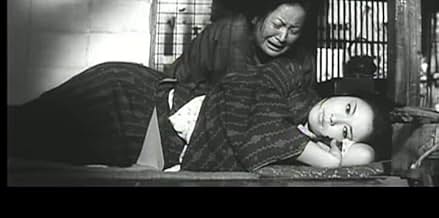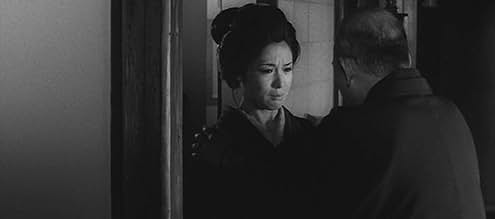Aggiungi una trama nella tua linguaOn the eve of the Russo-Japanese war at the beginning of the 20th century, small-town girl Okane has married an old wealthy man to escape a life of poverty.On the eve of the Russo-Japanese war at the beginning of the 20th century, small-town girl Okane has married an old wealthy man to escape a life of poverty.On the eve of the Russo-Japanese war at the beginning of the 20th century, small-town girl Okane has married an old wealthy man to escape a life of poverty.
- Regia
- Sceneggiatura
- Star
- Premi
- 3 vittorie totali
Recensioni in evidenza
This is a desperate story of how love can drive people to extremes to hold on to the ones they love and keep them safe. It's also a condemnation of Japanese militarism and small town bigotry. The violence when it comes is quite shocking but wholly appropriate to the story. It's one of the most real love stories you'll ever see on film.
This is a remake of a silent film (unfortunately I have not yet seen) from 1924.
A period drama set in the early 1900's at the time of the Russo-Japanese war. Everything being factually correct as far as I know. A woman that was in an arranged marriage to an older man who died. She returns to the village she is originally from although still an outcast from the time she had left. She meets, falls in love and marries a respected and distinguished soldier.
Ayako Wakao plays the lead for which she won a couple of Japanese acting awards. This performance could have won an academy award. She is outstanding. I think one of the best actresses of all time from any country. The rest of the cast is excellent.
The direction by Yasuzô Masumura also excellent. The editing is seamless. Not sure what could have been improved. The script and story are totally engrossing from start to finish. Plus it gives you things to think about. That is why I rate this movie a 10 out of 10. It is one of my most recommended Japanese movies I make to friends. Definitely should be watched.
A period drama set in the early 1900's at the time of the Russo-Japanese war. Everything being factually correct as far as I know. A woman that was in an arranged marriage to an older man who died. She returns to the village she is originally from although still an outcast from the time she had left. She meets, falls in love and marries a respected and distinguished soldier.
Ayako Wakao plays the lead for which she won a couple of Japanese acting awards. This performance could have won an academy award. She is outstanding. I think one of the best actresses of all time from any country. The rest of the cast is excellent.
The direction by Yasuzô Masumura also excellent. The editing is seamless. Not sure what could have been improved. The script and story are totally engrossing from start to finish. Plus it gives you things to think about. That is why I rate this movie a 10 out of 10. It is one of my most recommended Japanese movies I make to friends. Definitely should be watched.
An astonishing film in terms of it's relentless power to both shock and move. It has a quick and melodic pace, something rather uncommon for films of the time. It gets moving straight away and sets us in a world of misplaced honor and preconceptions. Wakao is simply stunning in both her looks and talent. She plays a beaten down woman with a lot of spite, but equal amounts of heart. After the death of her sugar daddy, she returns to her home village where she is seen as tainted goods. It isn't long before a role model soldier returns to the village and, against the wishes of the townsfolk, sets his sites on the outcast. The two both seem to be rebelling against society, but also do have genuine affection for each other. It isn't something that is easy to pull off. By the time the violent third comes around it is a disturbing act of love that perfectly sums up the complex themes running around. This film is unforgettable and I would even recommend it to those that find early Asian cinema a bit slow. Hopefully, this could open some doors.
Ayako Wakao was sold to a rich kimono merchant, who lavished everything on her. Now he's dead. She has returned to her village, where everyone despises her because of her past, except for Takahiro Tamura. They fall into lust and common-law marriage because his mother doesn't approve. He's the role-model soldier for village, and the Russo-Japanese War is about to begin. When he gets sent off to the assault on Port Arthur, the village goes back to treating her like dirt, until word comes that Tamura was injured, is in hospital, and will be given a week's leave She doesn't want him to go.
It's a movie that combines two two Japanese elements that look absolutely bonkers to a foreigner. First, of course, is the way everyone salutes the Emperor and is thrilled that Tamura has a chance to die; one of the characters says that a real hero is one who dies. The other is the sort of obsessive love that makes someone mutilate the object of their desire.
Well, it baffles me, if not all foreigners. Some people are weird.
It's stunningly performed and directed by Yasuzô Masumura, a leading light of the Japanese New Wave. As someone who decried Old Japan and New Japan, I think this expresses his disapproval of both.
It's a movie that combines two two Japanese elements that look absolutely bonkers to a foreigner. First, of course, is the way everyone salutes the Emperor and is thrilled that Tamura has a chance to die; one of the characters says that a real hero is one who dies. The other is the sort of obsessive love that makes someone mutilate the object of their desire.
Well, it baffles me, if not all foreigners. Some people are weird.
It's stunningly performed and directed by Yasuzô Masumura, a leading light of the Japanese New Wave. As someone who decried Old Japan and New Japan, I think this expresses his disapproval of both.
An absolutely Masterpiece from a great underrated director, who worked as assistant of Mizoguchi and his films, like those of his master's, are contemplative, although not such slow. Seisaku's Wife tells a rich and impressive story about an inevitable love in contradiction to military honor. You can see desperate life instinct in the age of imperial deadly values. This dichotomy, of course, is not unfamiliar in Japanese classic cinema: Naruse's Floating Clouds and, even more, Suzuki's Story of a Prostitute (also made in 1965) showed the same contradiction. But I found Masumura's movie stronger: Majestic pictures, simple but splendid music, and excellent performances.
It is strongly recommended, especially if you love infinite golden heritage of Japanese studio cinema.
Lo sapevi?
- ConnessioniRemake of Seisaku no tsuma (1924)
I più visti
Accedi per valutare e creare un elenco di titoli salvati per ottenere consigli personalizzati
Dettagli
- Tempo di esecuzione1 ora 33 minuti
- Colore
- Mix di suoni
- Proporzioni
- 2.35 : 1
Contribuisci a questa pagina
Suggerisci una modifica o aggiungi i contenuti mancanti

Divario superiore
By what name was Seisaku no tsuma (1965) officially released in India in English?
Rispondi


















